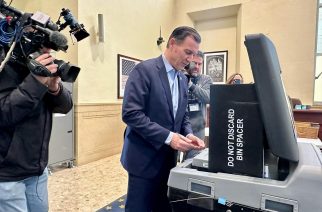
A four-member committee has recommended substantial pay raises for members of the state Legislature, the governor, lieutenant governor, state comptroller and state attorney general.
The New York State Compensation Committee — consisting of current and former New York state and New York City comptrollers — unveiled their recommendations Monday, December 10, after months of research and public hearings.
State senators and Assembly members have not received a pay raise in 20 years, but many rely on income from other jobs to supplement their $79,500 base pay.
The Compensation Committee is recommending a $50,000 annual pay increase, while limiting outside income to about $19,000 a year.
Under the new plan, stipends for serving on committees would also be eliminated for most rank-and-file lawmakers.
If the plan is allowed to move forward by the Legislature — they could convene and reject it before January 1 — the salary increase would be phased in over three years.
Assembly Speaker Carl Heastie, the only legislator to address the Compensation Committee during their public hearings, spoke about the erosion of the legislators’ salaries since 1999, when they last received a pay raise under Gov. George Pataki.
While the median household income in New York is up 67 percent during the past two decades, the $79,500 base salary for lawmakers now has a purchasing power of $51,401 when adjusted for inflation over 20 years.
Heastie said that, despite working many long hours in their districts, the cost of living in heath care, child care, and transportation has far outpaced their salary. As a result, members of the Legislature have been seeking positions in New York City government and the Executive Branch of state government at a much greater rate than in past years.
The Compensation Committee recommends that, starting on Jan. 1 of 2019, state legislators will receive an annual salary of $110,000. There will be no stipends except for leadership positions and key committee chairmanships such as Codes and Ways and Means in the Assembly and Finance in the Senate. There will be no cap on outside income for 2019.
Beginning on Jan. 1, 2020, lawmakers will receive an annual salary of $120,000 and their outside income would be capped at $18,000, which 15 percent of their legislative pay.
Beginning on Jan. 1, 2021, lawmakers would receive $130,000 a year and their outside income would be capped at $19,500, which is 15 percent of their legislative pay. This would be the long-term compensation for state legislators moving forward.
Assembly Speaker Heastie said Monday he has not read the report, but said “As I review it, I will be guided by the principles of the sanctity of independence and respect for the legislative branch which are embedded in the New York State Constitution. Above all else, as a new Legislature is about to be seated, these principles must be maintained.”
The Compensation Committee is also recommending pay increases for the governor, who would receive an annual salary of $250,000 after a three-year phase-in; the lieutenant governor, who would receive $220,000 after a three-year phase-in; and an annual salary of $220,000 for both the state comptroller and state attorney general after a phase-in period.
Executive branch commissioners and department heads would also receive pay raises under the plan, with Tier A commissioners making $220,000 after a three-year phase-in.
The Compensation Committee’s report, which can be found here, notes that “the duties and responsibilities of the commissioners, the governor and statewide elected officials and Legislature are amongst the most complex in the world. The output of New York State and the needs of its population dwarf those of many countries worldwide.”
New York ranks fourth in the country in terms of population and second in the country in terms of its operating budget. The overall gross product produced by New York ranks third in the United States with more than $1.5 trillion earned annually.
The report also states that salary data for New York legislators are not well-compared to legislators in most other states. Many states legislators who are considered “part-time” as compared to New York, which is in reality considered a more “full-time legislature, do earn less than New York’s salary of $79,500.
“However, New York’s legislators compare in workload and productivity to relatively few other legislatures in the country,” according to the committee’s report. “Further, differences in regional cost of living impact these salaries as well. The National Conference of State Legislatures for instance, compares New York only to Michigan, California, and Pennsylvania as equivalent to work product and time commitment. In some of those states, the salaries exceed that of New York.”
The committee is recommending that “only those legislators with the level of duties … in each house” should receive a stipend. This will create more equity amongst all 213 Legislators, more stability and transparency regarding legislative compensation and address certain ethical concerns associated with the stipends.”
The Compensation Committee which made these recommendations consists of current New York State Comptroller Tom DiNapoli; former State Comptroller H. Carl McCall; current New York City Comptroller Scott Stringer, and former New York City Comptroller Bill Thompson.
The Committee held four public meetings – three in Manhattan and one in Albany – between November 13 and December 6 of 2018.
The New York Public Interest Research Group, which has been monitoring the work of the Compensation Committee closely, issued the following statement: “The report of the State Compensation Committee does too little to reduce the risk of corruption in New York. While we agree with an approach that limits outside income and slashes the number of “lulus” available to legislators, much more needs to be done to respond to Albany’s ‘pay-to-play’ scandals, inadequate oversight of contracting and ethics, and weak campaign finance regulation.”









